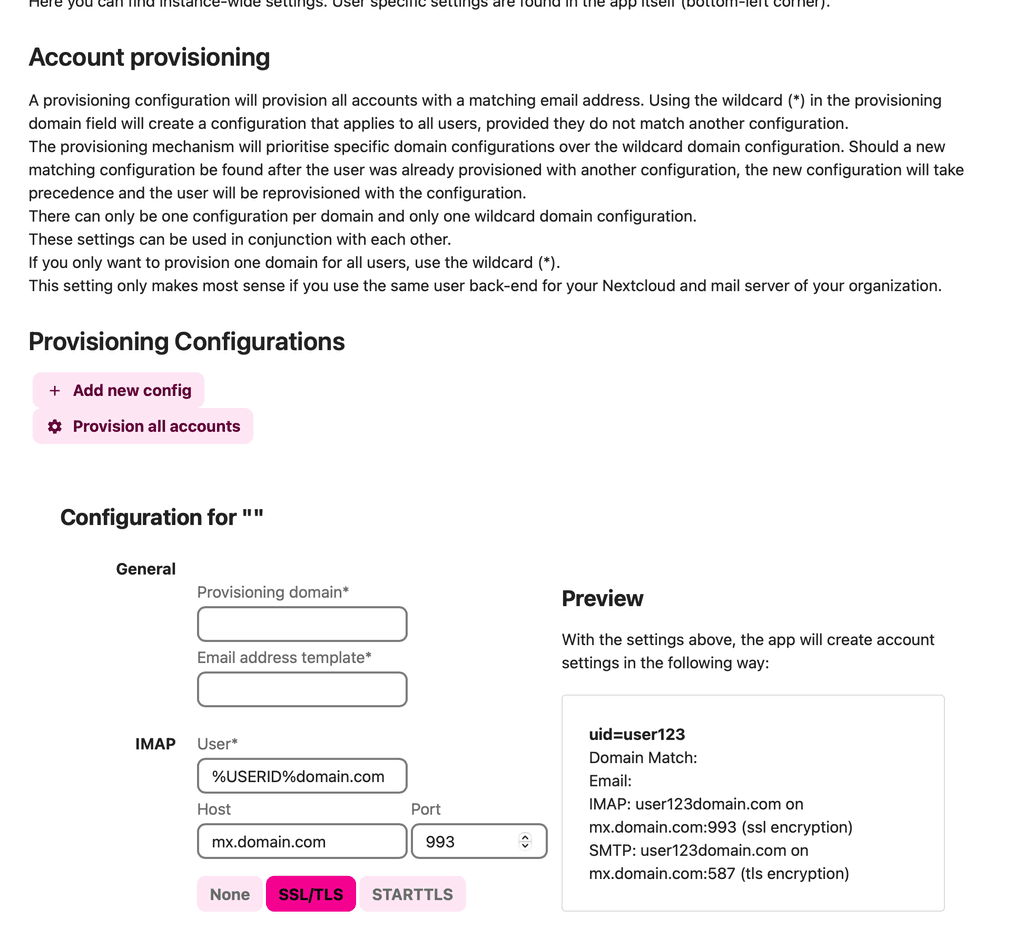Unable to read email via Nextcloud Mail app
-
Mail stopped working recently; updating to 5.1.1 did not help. When attempting to use the Mail app, the web console reports errors like
ServiceException IMAP error synchronizing account 5: No password provided. Could not load account mailboxes: IMAP error synchronizing account 5: No password provided.Around the same time, I started seeing errors in the logs like
NoUserException Backends provided no user objectand
Horde_Imap_Client_Exception No password provided. Error while running background job OCA\Mail\BackgroundJob\QuotaJob (id: 14118, arguments: {"accountId":5})It seems the Calendar app is similarly affected.
-
Mail stopped working recently; updating to 5.1.1 did not help. When attempting to use the Mail app, the web console reports errors like
ServiceException IMAP error synchronizing account 5: No password provided. Could not load account mailboxes: IMAP error synchronizing account 5: No password provided.Around the same time, I started seeing errors in the logs like
NoUserException Backends provided no user objectand
Horde_Imap_Client_Exception No password provided. Error while running background job OCA\Mail\BackgroundJob\QuotaJob (id: 14118, arguments: {"accountId":5})It seems the Calendar app is similarly affected.
@khm_ Unfortunately this is a downside of using SSO. There is the "Master Password" feature to work around that. But faik there is no solution within cloudron for that though.
-
@khm_ oauth is the way forward. In recent future, email auth will also move to oauth. Just using passwords is not secure anymore.
I just tested it, you just need an app password from Cloudron . https://docs.cloudron.io/profile/#app-passwords . Choose Mail Client . Each user has to create one for the mailboxes they own and put it in nextcloud mail app. After that it works even after relogin.
-
@khm_ oauth is the way forward. In recent future, email auth will also move to oauth. Just using passwords is not secure anymore.
I just tested it, you just need an app password from Cloudron . https://docs.cloudron.io/profile/#app-passwords . Choose Mail Client . Each user has to create one for the mailboxes they own and put it in nextcloud mail app. After that it works even after relogin.
@joseph only automatic configuration will fail. Manual still works without issues. Alternatively have people use SoGo
-
@andreasdueren what does automatic configuration mean? the mail app stores the raw cloudron password (how does it authenticate?)
Talking about the account provisioning
-
@andreasdueren yeah, I think the last line gives it away "only makes sense if you use the backend for nextcloud and mailserver" . So, it is taking the raw password that was given during nextcloud login and using it for the mail server. Seems a bit dangerous (to allow an app to get the raw password) but what do I know
-
@andreasdueren yeah, I think the last line gives it away "only makes sense if you use the backend for nextcloud and mailserver" . So, it is taking the raw password that was given during nextcloud login and using it for the mail server. Seems a bit dangerous (to allow an app to get the raw password) but what do I know
@Joseph Yeah basically this seems to parse the password and store a hash every time you log in (to check for password changes) and if you used SSO this if obviously not possible. A way to enable global provisioning would be to generate a global master password for all mail accounts and then use that here. But I don't think this is a tradeoff I'd personally be willing to do, even if cloudron did offer that function.
-
@Joseph Yeah basically this seems to parse the password and store a hash every time you log in (to check for password changes) and if you used SSO this if obviously not possible. A way to enable global provisioning would be to generate a global master password for all mail accounts and then use that here. But I don't think this is a tradeoff I'd personally be willing to do, even if cloudron did offer that function.

